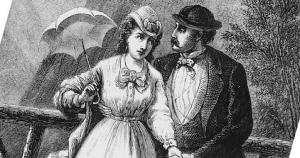 Love is the greatest good, but even love can go wrong. Perhaps everything that has ever gone wrong for human kind is love done badly. Eve and Adam wanted a delicious fruit, knowledge, all good desires by themselves. They forgot their deeper relationship with God and His wise warnings.
Love is the greatest good, but even love can go wrong. Perhaps everything that has ever gone wrong for human kind is love done badly. Eve and Adam wanted a delicious fruit, knowledge, all good desires by themselves. They forgot their deeper relationship with God and His wise warnings.
Love degenerated to desire.
As the most powerful and enduring virtue, charity is the most dangerous. Twist charity, misapply love, and what is good does evil. (Lord have mercy on me a sinner!) Just as hope can become a mere delusion, faith irrational, so love can be reduced to passions.
This matters to a Christian in particular, because Christianity is a romance. We are commanded to live by love. Who do we love? We must love even our enemies. As an ideal, this is most excellent, in practice we fail. Cataloging these failures helps others do better than we have done. A master of Christian romance was Anthony Trollope, the better than Dickens novelist who could know the joys of romance (Doctor Thorne) and the limits (oh Lily Dale!)
Trollope was willing to write hundreds of pages and not give the reader a happy ending, instead giving a realistic ending for the characters he created. The hobbledehoy, the awkward youth, can be forgiven, but not if he does not grow up. A hobbledehoy grown old is a cad. A man cannot get a happy ending if he makes unhappy choices.
Put simply, if we are unloving enough, then when love might come, we are not capable of romance.
Trollope knew that there were many causes for such errors in the brilliant, if emotionally brutal, Sir Harry Hotspur of Humblethwaite, he takes good values, cherished virtues that save many characters in his other books, and shows how they can go wrong. The title of the novel (all those Hs!) is as deceptive as many of the characters: sounding comic, being tragic.
The father of the tragedy is a good man Sir Harry Hotspur who spawns a tragedy by loving his family, his name, and his land too much. In many of his books, Anthony Trollope shows how essential such loves are for England, but in this book he shows how love can go wrong. Sir Harry introduces a serpent into the family circle as a result of his disproportionate love. Sir Harry has lost his son and heir and so Captain George Hotspur will inherit his title. His daughter Emily will get the land and money. The obvious solution is to marry the title to the money and have everyone live happily every after, but George Hotspur is a grifter, a liar, and a cad.
Sadly, he is also plausible and so wins the heart of Sir Harry’s daughter: Emily. She is true to him, holding out the Christian hope of his repentance and reclamation. This too goes wrong as she will not allow George to reject God, virtue, and her love. She will not let go of him. She is more sinned against than a sinner, but still her love is disproportionate and so tragic.
Lady Elizabeth, Sir Harry’s wife, was too much Sir Harry’s wife. She loved him to the point of losing herself and so is useless to him, herself, and her daughter. She cannot say “no” when “no” should be said, because her focus on her family had reduced her. Oddly, she was so intent on being a “good wife” (as it was understood at the time) that she became too weak to be a good wife.
As for Captain George: he loves himself as he hopes everyone else will love him.
Things do not turn out well for anyone, because, of course, they cannot. The rules of the romantic road are real and Trollope is a good teacher.
Read the book.











